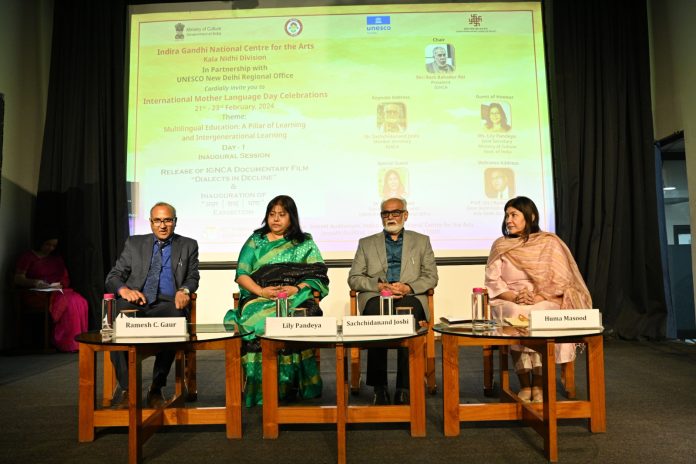
The base of quality education lies in linguistic education- Lily Pandeya, Joint Secretary, MoC, GoI
There is a need to search for and preserve disappearing languages- Dr. Sachchidanand Joshi
22nd February, New Delhi:
To commemorate International Mother Language Day, the Kalanidhi division of the Indira Gandhi National Centre for the Arts, in collaboration with UNESCO, New Delhi, organized a significant event. On the second day of this event, a thought-provoking panel discussion took place focusing on the theme “Multilingual Education: A Pillar of Learning and Intergenerational Understanding”. Languages play a crucial role in fostering mutual understanding and cultural exchange globally. They serve as the essence of our identity, with our mother tongue forming the bedrock of fundamental values and behaviours. Recognizing the crucial role of languages, UNESCO declared November 17, 1999, as International Mother Language Day, which has been observed worldwide since February 21, 2000. In observance of International Mother Language Day, a three-day seminar commenced on Wednesday at the Indira Gandhi National Centre for the Arts. The esteemed presence of Ms. Lily Pandeya, Joint Secretary of the Ministry of Culture, graced the occasion as the chief guest on the inaugural day of the event, emphasizing the significance of linguistic diversity and its preservation.
Ms. Lily Pandeya highlighted the recent implementation of the new National Education Policy, emphasizing its focus on linguistic diversity. She stressed that linguistic education is fundamental to quality education. Ms. Pandeya also noted the role of culture in goal achievement, highlighting global recognition of its importance for future development. She urged the promotion of culture and preservation of cultural heritage for sustainable development. She posed a question about passing on linguistic diversity to future generations, prompting further discussion.
Dr. Huma Masood, Senior Gender Specialist at UNESCO, New Delhi, highlighted UNESCO’s significant efforts in promoting linguistic diversity. She explained UNESCO’s initiative to celebrate International Mother Language Day on February 21st to foster linguistic diversity.
Dr. Sachchidanand Joshi, Member Secretary of IGNCA, presiding over the program, emphasized the significance of Mother Language Day in showcasing India’s diverse linguistic landscape. He revealed findings from UNESCO’s ‘Atlas Survey’, indicating 454 registered languages in India while noting that a 1961 language survey identified around 600 languages. Dr. Joshi expressed concern over the existence of over 900 languages with only names known, and lacking related information. He urged efforts to identify and preserve these languages for posterity.
During the initial day of International Mother Language Day, IGNCA screened the documentary film ‘Decline in Dialects’. This enlightening documentary delves into various facets of endangered dialects, providing a detailed examination of their challenges and significance.


















